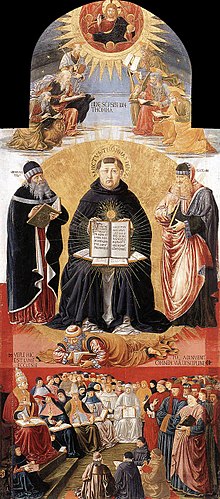
Back توماوية Arabic Tomismu AST تومیسم AZB Tomisme Catalan Tomismus Czech Tomistiaeth Welsh Thomisme Danish Thomismus German Θωμισμός Greek Thomism English

Thomism is a philosophy and theology school based on the ideas of Thomas Aquinas, a Dominican philosopher and theologian from the 1200s. His famous works include disputed questions and commentaries on Aristotle in philosophy, and the Summa Theologica in theology, which is very important in medieval theology and still guides the Catholic Church's philosophy and theology.
Pope Pius X in 1914 emphasized that understanding the Church's teachings requires knowing Thomas's fundamental ideas. According to him, these ideas are like the solid base for understanding both natural and divine things. If these principles are ignored, it becomes hard for students to grasp the meanings of the Church's teachings.[1]
Thomas Aquinas believed in accepting truth from any source. He combined ideas from Greek, Roman, Islamic, and Jewish philosophers. He was a realist, meaning he thought the world could be known as it is.[2] Thomas often supported Aristotle's views and used Aristotle's terms and ideas. He also followed some neoplatonic principles, such as the belief in God as the essential being and everything being good by participating in this essential goodness.[3]
- ↑ "Doctoris Angelici". web.archive.org. 2009-08-31. Archived from the original on 2009-08-31. Retrieved 2023-11-29.
- ↑ "SUMMA THEOLOGIAE: The mode and order of understanding (Prima Pars, Q. 85)". www.newadvent.org. Retrieved 2023-11-29.
- ↑ "SUMMA THEOLOGIAE: How the soul while united to the body understands corporeal things beneath it (Prima Pars, Q. 84)". www.newadvent.org. Retrieved 2023-11-29.